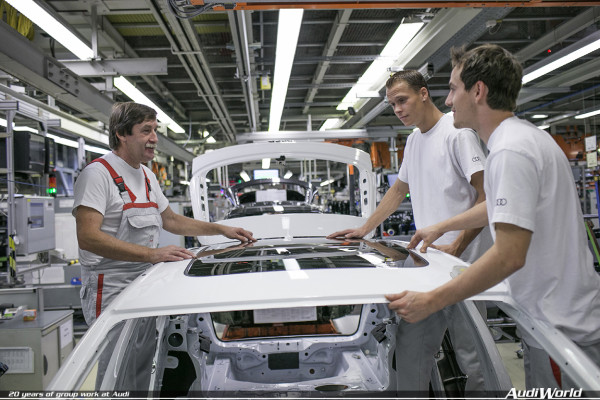20 years of group work at Audi
- Changes in the working world as an opportunity for innovation
- More individual responsibility, increased flexibility and integration
- Dr. Frank Dreves: “Group work is a key element of the Audi production system.”
Ingolstadt – Organizing working routines in one’s own responsibility: that’s group work at Audi. AUDI AG introduced this new way of working in production already 20 years ago. Before that, there was a strictly hierarchical organization of working processes and employees were barley involved in their planning. Today, Audi employees work independently in groups, are responsible for their units and are integrated into change processes. The concept of group work has proven its worth at Audi and is put into general practice at the production sites of the brand with the four rings.
Fitting dashboards, screwing on the underfloor, installing the steering wheel – thousands of small jobs have to be done before a car rolls off the assembly line. In the Audi production system, this is done by means of group work. In almost all areas, employees are allotted into small teams in which eight to twelve people work together. The idea behind this method is to create a form of working organization that focuses closely on the humans, integrates them more in the design of working routines and the process of continuous improvement, and achieves more flexibility.
“As an attractive employer, the focus at Audi is on the people. Group work is an ideal working organization in which our employees can creatively deliver input to the working process,” emphasized Dr. Frank Dreves, Board of Management Member for Production at AUDI AG. “Group work is meanwhile a key element of our Audi production system.” It enhances satisfaction amongst employees, line managers and executives, and is an important basis for progress in quality and productivity.
Before Audi introduced group work in 1993, the organization of production was very hierarchic. Foremen allotted workers to various tasks and were the key contact persons in production. Employees had no influence on the organization of their work; for example, days off were allocated automatically and absences were centrally controlled. Many employees carried out the same manual operations day in day out and their work was very monotonous. Contributing one’s own ideas was virtually impossible.
A lot has changed since then: Groups organize themselves and their work independently and quickly solve problems. Their members decide who carries out the various tasks and when. And they make suggestions about how processes can be improved and work can be organized more ergonomically. Each employee masters multiple tasks and therefore moves to another position roughly every two hours each shift. That provides variety and avoids one-sided stresses.
The group spokespersons have a special function with regard to collating information: They make sure that all positions are occupied at the beginning of each shift, chair group discussions once a week, and provide assistance if anyone needs support on the line. Like Rudolf Heinzlmeier. He has been working on A4 assembly for 35 years and has been a group spokesperson for 20 years. He witnessed the start of the new form of organization first hand. “When we introduced group work 20 years ago, it was a big change,” says Heinzlmeier. The fact that the workers made decisions was unusual for many of us at first.” The group corners were also new, which Audi employees can now use to relax during their three breaks per shift. The group discussions also take place there.
Another positive result of group work is that older workers and those with restricted capabilities are integrated into the group as full members. Any tasks that they cannot perform due to some limitation are compensated for by their colleagues. “If anyone cannot take over a particular task, we discuss it. We then make a decision together, and that makes people more satisfied,” explains Heinzlmeier.
At present, 2,794 groups are active at the Audi sites in Ingolstadt, Neckarsulm, Győr and Brussels – 1,227 of them are in Ingolstadt and 777 are in Neckarsulm. The concept of group work has proven its worth in the past 20 years; Karl Unger, Head of Production Strategy, is convinced of that. In his previous position as a planning manager, he had a major influence on the development and introduction of group work at Audi 20 years ago. “Our employees optimize working routines within their areas on the basis of their experience and ideas,” states Unger. “That is only possible thanks to the flat hierarchy. Short decision-making processes, a high degree of problem-solving competence and thus also enhanced productivity are particularly positive results of group work.”
The importance of group work is also underlined by Klaus Schweiger, Head of HR Ingolstadt: “Group work benefits not only the company, but also the workforce – it gives employees greater autonomy and ergonomically better working conditions, for example. Those who can carry out the core tasks of their own group can, depending on their suitability, develop their skills – not just within one group but also beyond it.”
Audi intends to stay with the concept of group work in the future. “The central idea of group work will continue to apply,” says Unger. “But the working world is constantly changing – due for example to electrification, the increasing diversity and complexity of our automobiles as well as demographic change. Already today, these factors have a great influence on working requirements and contents.” That’s why the brand with the four rings has set itself the goal of making jobs even more attractive and of catering even more for the individual capabilities of each employee. For example, intelligent rotation concepts and improved training methods are being prepared for group work. In addition, the company is already thinking intensively about modern standards for group work, such as with innovative concepts for group corners and the integration of new media.

